
|
Gilda
(1946)
In Charles Vidor's and Columbia Pictures' semi-trashy,
steamy, noirish romantic drama-mystery - with suggestive themes that
included implied impotence, sadomasochism, misogyny and homosexuality,
although liberally camouflaged by euphemisms and innuendo to bypass
the Production Code; its main theme was a strange, tawdry, aberrant
romantic triangle (menage a trois) between the three main
characters (husband, wife, and lover) - with homo-erotic overtones.
The daring and quirky film's tagline proclaimed:
"There NEVER was a woman like Gilda!"
The film-noirish screenplay by Marion Parsonnet (and adapted by Jo Eisinger),
was taken from an original story by E. A. Ellington.
The complex, eccentric, perverse, decadent and cynical
tale was in keeping with the prevailing attitudes of the American
post-war era, playing upon US political paranoia of German-Nazi war
criminals who escaped and assumed new identities in South America.
[Note: Another similar plotline was found in Hitchcock's Notorious
(1946). There were also many similarities to the Best Picture-winning
film from a few years earlier, Casablanca (1942) -
an exotic and remote setting, a casino, a dysfunctional or problematic
love triangle (between a female, a European and an American), intriguing
characters, memorable dialogue, and a backdrop or subplot regarding Nazis, etc.]
Rita Hayworth was featured in this dark and complex
noir (of a love triangle) with her sleek and sophisticated eroticism,
lush hair and peaches and cream complexion. The gorgeous 'love goddess'
or "bombshell" portrayed the recent sexy, hedonistic, auburn-haired
wife of South American casino owner, German-born Ballin Mundson (George
Macready) (and crooked head of an illegal, international - Nazi -
tungsten cartel), who had hired amoral gambling drifter and small-time
hood-adventurer Johnny Farrell (Glenn Ford) (Gilda was Johnny's ex-flame)
as his right-hand confidante ("boy") and casino manager:
- in the opening homoerotic sequence, the camera moved
upward from a void into a dark and crowded room as a voice-over was
heard from down-on-his-luck, oily-haired gambling drifter Johnny
Farrell (Glenn Ford); he was engaged in a crooked game of craps (with
loaded dice) against American sailors in a waterfront dive: "To
me a dollar was a dollar in any language. It was my first night in
the Argentine and I didn't know much about the local citizens. But
I knew about American sailors, and I knew I'd better get out of there"
- the disagreeable, crippled, scar-faced (on the right
side of his face from a sword wound), mysterious casino-owning German
Ballin Mundson (George Macready) in Buenos Aires, Argentina saved
Farrell from retailation by angry, swindled sailors in a dark alleyway;
the elegantly-dressed Mundson violently wielded his ebony cane and
its protruding stiletto dagger (a perverse, compensating Freudian
erect phallic substitute) against a street tough, and then bragged: "It
is a most faithful, obedient friend. It is silent when I wish to
be silent. It talks when I wish to talk"; Johnny noted: "You
must lead a gay life" - so true; Johnny lighted Ballin's cigarette
afterwards - a coded symbol of their underlying homosexual bond;
Mundson invited Farrell to visit his illegal
Buenos Aires casino a half hour distance on the other side of town,
offering him an entry key or pass, but also warned: "They
won't let you use your own dice"

Johnny's First Visit to the Illegal Buenos Aires Casino
|

Johnny Noticed in Casino by Unidentified Character (Police Inspector Obregon)
|
- Farrell took him up on the offer, and was next
seen in the casino's washroom, and regarded by the attendant as
a "peasant" for a cheap tip; in a private gaming room, he was
noticed by an unidentified character (Police Inspector Obregon,
important later in the plot); after he was thought to be cheating
and winning at blackjack, Johnny was pressured by two strong-arm
enforcers to visit Mundson's upstairs office where he was told
he was "in trouble." After scuffling with the two thugs, Johnny
convinced Mundson ("the little man with the sharp friend") that
his cheating and gambling skills would be perfect for the job of
croupier-manager for the baron-billionaire Mundson's casino:
"I'll be better if you had me on your side..."; Johnny promised
himself to Mundson as a male friend: "You see, this way you'll have
two friends. You've no idea how faithful and obedient I can be for
a nice salary," as they also both agreed that "gambling and women do not mix"
- Mundson often observed the casino from behind his
office windows covered with louvered steel shutters; later
as the two men shared a drink and celebrated the end of WWII ("Germany
Surrenders"), they toasted: "To us, Johnny. To the three of us"
(Farrell, Mundson, and his 'sharp friend')
- Mundson left town for business for a few weeks (while
Johnny took over as major domo), but then returned with a new trophy
wife; he wished to show his new possession to Johnny in his glittering white house
- one of filmdom's best-known film entrances occurred
when Johnny was led into Mundson's bedroom to greet the gorgeous
Gilda (Rita Hayworth as the era's movie-star 'love goddess'), an
exuberantly healthy American in an inner bedroom suite; she was
referred to as a "canary," singing along to a phonograph recording
of "Put the Blame on Mame"
- she suddenly appeared out of nowhere from beneath
the screen, as the seductress threw back her head and tossed
her thick mane of hair in a blatantly sexual response; she was
introduced by her new mobster-husband Ballin Mundson: (Mundson: "Gilda,
are you decent?" Gilda: "Me?");
she gave a long, sensual look at Johnny, Mundson's recently-hired
casino manager, and pulled up one side of her strapless dress to
cover her naked shoulder as she added: "Sure, I'm decent"
|
Johnny's Introduction to Gilda (Rita Hayworth)
by Her Husband Ballin Mundson
|

Mundson: "Gilda, are you decent?"
|

Gilda: "Me?"
|

|

Gilda: "Sure, I'm decent"
|
- her presence stunned Johnny - it would soon split
the semi-explicit liaison between her husband and "the hired
help"; Johnny realized the obvious intrusion into their own bonded, male
relationship and felt some visible antagonism toward her: ("...women
and gambling don't mix"); Mundson claimed he had known her for
only one day before their marriage; Johnny realized
that both of them were similarly dominated by the casino owner
after being picked up by him; after Johnny left, Mundson and Gilda discussed Johnny's entrance into
their lives; when she called him a "very attractive man," Mundson's
jealousy prompted him to call Johnny only a "boy"
- in the casino lobby before dinner, Johnny mentioned
that he saw evidence at the roulette wheel that Mundson was allowing
a short-statured blackmailer (Saul Martell, credited as "Little
Man") to receive bribes or winnings ("payoffs")
to keep him quiet - for some unknown reason; Johnny suspiciously
asked questions of his boss: "Gambling is illegal in Argentina, is that right?...Is that
the reason for the pay-off?", and Mundson acknowledged: "Naturally,
that's the reason" and then quickly changed the subject
- in the casino dining room during the threesome's
dinner, Johnny discussed their new tortured love triangle; he feared
that Mundson's cane-dagger would now been displaced by her, and
explained how the dagger could be compared to a woman, deceitful
in character: "Because it looks like one thing, and then right in front of your eyes,
it becomes another thing"; during a toast, Johnny agreed
to drink to Gilda's hate-filled proposal that she be served up
as a hateful object between them because of her intrusion into
their bonded male lives [Note: the film's MacGuffin was the unknown
nature of the relationship between Gilda and Johnny before their
breakup as a couple]
- Gilda and Johnny have their first opportunity to
speak together when Mundson is called away for business with two
shady Germans; Johnny is antagonistic (and jealous) toward both
Gilda AND Mundson because the humorless, controlling husband was
maintaining him as a kept-man, and because she was a gold-digger
in an unloving relationship [Note: The femme
fatale was the former flame of Johnny and both were ex-patriate Americans; they
were keeping their past relationship a secret from Mundson.]
- another secret of Mundson's was that the casino
was revealed to be a front for a world-takeover plan; Mundson had
made millions on an international illegal tungsten cartel (presumably
for the group of German mobsters or Nazis)
- Gilda was offered a dance with an attentive Latin
man, Captain Delgado (Gerald Mohr) - and she accepted to basically
antagonize Johnny; when Mundson returned, Johnny
was ordered to stop his wife's provocative dancing and to prevent her
from engaging in blatant, flirtatious behavior in public; Johnny warned
Gilda about Mundson's presence: "Pardon me, but your husband is showing"; Johnny
was then entrusted to become his bodyguard or watch-dog to oversee
her trampy behavior in the casino, and to protect Ballin from any subsequent
heartbreak
- after the three came back to their table, Mundson
toasted with Johnny (and Gilda) - wishing "disaster" on the promiscuous
woman who had destroyed Johnny's past love life: "Disaster
to the wench who did wrong by our Johnny" - he foreshadowed
the clashing, disastrous and sizzling love-hate relationship that
the two would develop in each other's company
- afterwards in her bedroom, Gilda lied to Mundson
about not knowing Johnny from before: "I'm telling you the
truth. I didn't know him. I don't think I've ever known him, Ballin";
however, with her lingering love for Johnny although he pushed her away as a
sexual rival, Gilda served herself up to be the object of a tension-filled,
love-hate relationship between them

Gilda's Lie to Mundson That She Didn't Know Johnny In Her Past
|

Mundson: "Hate can be a very exciting emotion"
|
- Gilda even told Mundson how spiteful they were of each other: "If you're worried
about Johnny Farrell, don't be. I hate him"; but Mundson
realized the emotion that she was generating: "And he hates you.
That's very apparent. But hate can be a very exciting emotion. Very exciting"
- in the film's subplot, the blackmailer
was being reprimanded in Mundson's office and complaining about
not receiving any more bribes or "payoff" for keeping quiet and
compliant; now, Mundson refused to deal with the businessman after
acquiring a monopoly that was easily squashing any competition
from him related to his tungsten-filament business (with his two German cohorts)

Disgruntled Blackmailer (Saul Martell) (credited
as "Little Man")
|

Blackmailer's Attempt to Assassinate Mundson in the Casino
|
- meanwhile in the casino, to inflame
Johnny's jealous passions, two-timing Gilda was dancing and flirting
with another good-looking Latin male escort
Gabe Evans (Robert Scott) - and when dragged from the casino dance
floor by Johnny, Gilda delivered her most famous and suggestive
one-liner: "Didn't you hear about me, Gabe? If I'd been a ranch, they would've named
me the Bar Nothing"
- in the bar area where Ballin was asking Johnny about
Gilda's whereabouts, the blackmailer opened fire with two
errant gun shots aimed at Ballin; Johnny explained
away the blackmailer's subsequent suicide in the washroom by blaming
everything on his "gambling" losses. Ballin
was totally shaken by the incident, and decided to confide in Johnny; the
power-obsessed monopolist Mundson showed Johnny his safe (and combination),
important documents, and how he was in charge of an international
tungsten cartel - it was the casino's real cash cow, and part of
his plan to gain power and dominate the world's markets: ("The man
who controls the strategic material can control the world, Johnny")
- shortly later, when Johnny vowed to prevent
Gilda's two-timing of Ballin with Gabe, she vowed to Johnny:
"I'm going to do exactly what I please when I please";
he planned to control her every move and to protect her for Ballin's
sake; acting as a dutiful and loyal
employee, Johnny simultaneously expressed both his obsessive love
and loathing for her; Johnny tortured himself trying to keep Gilda's
many indiscretions hidden from Mundson; Gilda resisted him: "Who
do you think you're kidding, Johnny?" Johnny became
particularly spiteful at the flirtatious attention she showed others
(voice-over): "I hated her so, I couldn't get her out of my mind for a minute. She
was in the air I breathed, and the food I ate..."
- Gilda performed two renditions
of "Put the Blame on Mame" -
the first rendition was at five o'clock one morning, when Johnny was awakened in the
upper casino office by the wafting sounds
of Gilda' singing; at the slatted window, he looked down and saw
her below seated on the roulette table, strumming and singing a sad
version of Put The Blame on Mame, while accompanying herself with a guitar;
she was singing to an audience of one - the washroom attendant Pio (Steven Geray)

|

|

|
|
Gilda Strumming and Singing "Put
the Blame on Mame" at 5 AM in the Casino
|
- Johnny was wearing a striped bathrobe and Gilda joked - hinting at his bisexuality: "Oh.
Good morning. How very pretty you look in your nightgown"; she
suggested an excuse for the two of them: "Swimming...You went
swimming with me. Didn't we have a good time?"
- Gilda admitted to Johnny that she had foolishly
married Ballin on the "rebound" from
her relationship with him, and then expressed how much she hated his callous nature: "Would it interest
you to know how much I hate you, Johnny?"; under the watchful
eye of Mundson, Johnny escorted Gilda to her home from the casino,
and told his boss the unlikely alibi that they had been swimming
together; Mundson (seen as a black silhouette) worried he might be
losing Gilda to Johnny ("I thought I had lost you")
- Johnny was confronted in his office by Ballin's
two threatening German contacts (or "messenger boys"),
one wielding a gun; he notified Mundson about their presence by phone
- during the casino's festive celebration of Carnival, Mundson was called away to meet with
his two German contacts ("messenger boys"), and had asked Johnny
to escort Gilda to the party; their hatred
for each other sizzled as the former lovers danced closely together;
she provocatively and slyly offered: "I
can help you get in practice again, Johnny. Dancing, I mean" -
referring to how she might stimulate his sexual interest in her;
Johnny pushed her away, causing her to depart before the unmasking
at midnight for a late-night rendezvous with another man
- shortly later in the casino at midnight during the
unmasking, one of the German-speaking [Nazi] "messenger-boys" was
discovered murdered (by Ballin with his dagger);
Mundson was facing problems with his German business associates
by refusing to turn over the business to them
- in his darkened office, Mundson
instructed Johnny to retrieve Gilda for the second time: ("Wait for
me at home, Johnny. I may need both of my little friends tonight");
he then called the nearby airfield to confirm pre-arranged travel plans
- after Johnny returned her home at 2 AM, the vixen
attempted to entice Johnny with a sultry reminder: ("There
isn't anybody here but us, you know"); in the upstairs bedroom,
although Johnny was hateful toward her and ordered her out, Gilda
passionately confessed her love for Johnny: "Hate
is a very exciting emotion. Haven't you noticed? Very exciting. I
hate you too, Johnny. I hate you so much, I think I'm gonna die from
it. Darling. (She fell into his arms and they kissed) I think I'm
gonna die from it"; a second kiss was interrupted by the loud sound of a closing door
from outside the bedroom
|
Alone Together in Ballin's Home
|

Gilda: "There isn't anybody here but us, you know"
|

Johnny: "You're getting out of here"
|

Gilda: "You do hate me, don't you Johnny?"
|

Gilda: "Hate is a very exciting emotion"
|

Gilda: "I hate you so much, I think I'm gonna die
from it"
|

Gilda: "I think I'm gonna die from it"
|
- Mundson had witnessed their
romantic dalliance by catching them in a passionate embrace
and kiss; he decided to disappear for multiple reasons; Johnny (and
Obregon's police car following him) raced after Ballin to an airstrip
and they both watched a suicidal airplane
crash into the ocean. Ballin was presumed dead
- [Note: Unknown to everyone, the crash was faked
since Mundson had parachuted into the water where he was picked
up by a boat en route to a seaplane. To an accomplice who picked
him up in the water, Mundson explained that he staged the crash
in order to elude the police's investigation into the murder of
the German, and escape further questions about his corrupt and
troublesome Nazi cartel dealings: "I'll stay away as long as necessary
and then I'll go back and attend to something."] The
two reunited lovers guiltily thought that they were responsible
for Mundson's (faked) 'suicide.'
- Ballin's will left everything to Gilda - his estate
and fortune, but Farrell was assigned as its "sole executor." Farrell
ran the casino (assuring everyone it would be "business as usual"),
and he took over as head of the illegal tungsten business; one of
the German cohorts demanded that Farrell turn over the tungsten-cartel
patents (that Mundson had bought in a "gentleman's agreement" and
promised to return), but he refused
- Gilda
and Farrell resumed their dangerous taunting affair; Johnny
recreated himself as Mundson by taking Gilda as his wife, and he
vengefully turned their marriage into a punishing trap. He married
her to punish her for constantly betraying Mundson and being unfaithful
to him, replacing Mundson as Gilda's emotionally-abusive, misogynistic husband in
a continuing love-hate relationship: (fulfilling the previous toast: "Disaster
to the wench") - he treated Gilda with increasing sadomasochism,
vindictiveness and abuse after taking her as his wife; he punished
and tormented her for her past unfaithfulness by restricting
her movements and taking her freedom away: (Johnny's perverse voice-over: "She
hadn't been faithful to him when he was alive, but she was gonna
be faithful to him now that he was dead.")
- after
being shunned and locked away Gilda confronted Johnny in the casino
office and questioned the icy treatment she had been receiving:
("Hello, remember me? I'm Gilda, your wife. Remember?"); she also asked
expectantly of Johnny: "Got
a light?" - he turned and stood there with the lighter flame burning for her
as she lit her cigarette; she claimed that she had always been faithful
to him: "All those things I did were just to make you jealous, Johnny. There's
never been anybody but you and me" - but he remained doubtful:
("Admit them and tell me who they were"); in retaliation, Gilda fled
from her horrible relationship and arranged more trysts and dinner dates with other men
- ultimately, to escape
from Farrell's possessiveness, Gilda fled to Montevideo (Uruguay)
to seek a divorce, where she took a job as a club singer while
involved with a man - Thomas Langford (Don Douglas); Farrell pursued
her there and with Tom's concurrence, he promised that if she returned
to Buenos Aires, he would annul their marriage; however, Farrell
betrayed Gilda once she arrived back in Buenos Aires - it was revealed
that Tom was one of Johnny's hired thugs posing as an affluent
lawyer, to help get her back and continue punishing her; feeling
betrayed and enraged, Gilda slapped Johnny repeatedly across the
face, beat on his chest, and then slumped to the floor in front
of him: ("I can't stand it anymore. I don't want anything from you. But please,
just let me go")

Gilda - A Nightclub Singer in Montevideo
|

Thomas Langford (Don Douglas)
|

Upon Her Return to Argentina, Gilda Was Betrayed
by Langford - and Johnny
|

Gilda Breaking Down In Front of Johnny
|
- meanwhile, police inspector Maurice Obregon (Joseph Calleia), who had been scrutinizing
the South American casino's underlying criminal activities (with
shady German-Nazi industrialists and tungsten mines) and trailing
Ballin Mundson and Johnny Farrell throughout the entire film, threatened
to now close the casino unless Farrell talked: "We
know you're the head of a tungsten monopoly, Mr. Farrell. What we
want to know is the names of the participants...I'll wait"
- they were distracted by Gilda's bawdy, sexy casino performance/glove striptease
while singing the torchy number "Put the Blame on Mame, Boys";
it was a defiant song, with lyrics filled with double entendres,
describing a dangerous, threatening kind of woman who was often blamed
- unfairly and illegitimately - by men
- she performed the memorable, bawdy glove-striptease dance before a large
live casino audience (backed by an orchestra), as she was swathed
in a slinky black satin dress displaying bare upper arms and shoulders;
she drunkenly beckoned with extended arms toward the lusting men
in the audience and peeled off one of her long, elbow-length black
satin gloves as she sang the defiant number - keeping the casino
audience (and viewers) in suspense - wondering whether the strapless
gown would remain suspended on her frame

|

|

|

|

|

|

|

|

|
|
Gilda's Famous Strip-Tease, in a Satin, Black
Strapless Dress
|
- to proceed further with undressing after receiving accolades and encore-applause,
Gilda flung her second glove toward the hungering audience; as she
started to shed her strapless dress, she entreated two gentlemen
volunteers from the audience to join her onstage for assistance -
to take off her dress! ("I'm not very good at zippers, but maybe
if I had some help")
before she was dragged off the stage and Johnny struck Gilda hard
across the face for being overtly flirtatious and provocative
- Obregon
continued to speak with Johnny after the blow-up with Gilda; he informs
Johnny that he has arrested one of the agents of the Nazi-controlled
cartel: "The German has been arrested. He will give us the information we want.
Now, all we want from you are the patents and the agreements bearing
the signatures. Let me tell you why we must know who these signers
are, Mr. Farrell. So they can be prosecuted legally for breaking
the anti-trust laws. You didn't hear a word of it, did you? All
you can think of is the way Gilda looked at you when you struck
her, isn't it? You two kids love each other pretty terribly, don't
you?" Johnny was more perturbed by Gilda than the threat of
prosecution; he responded with three words against his hateful wife
Gilda: "I hate her"
- Obregon continued his assessment of their relationship: "That's what I mean. It's
the most curious love-hate pattern I've ever had the privilege
of witnessing. And as long as you're as sick in the head as
you are about her, you're not able to think about anything clearly"
- Obregon announced his arrest of Farrell and the closing of the casino: "All
right, Mr. Farrell. You're under arrest for illegally operating a
gambling casino. I'm gonna let you stay here under protective custody.
Send for me when you can't stand it anymore. I intend to have those
signatures. I can out-wait you, Mr. Farrell. You see, I have the
law on my side. It's a very comfortable feeling. It's something you
ought to try sometime"; under pressure,
Johnny finally relinquished the patents from the wall safe to the
detective, and turned over all of the incriminating
information regarding the tungsten business to Obregon
- the inspector also pressured Farrell to reconsider his relationship with
Gilda, knowing that she was planning to return
home to America from Buenos Aires; when he asserted that she wasn't really scandalously unfaithful to either
husband (Mundson or Farrell): ("Gilda didn't do any of those
things you've been losing sleep over - not any of them. It was just an act, every bit of it")
- in the dark and closed casino, Johnny finally realized
that he was really in love with her when he was about to lose her;
he began to reconcile himself to Gilda, admit how wrong he was,
and apologize for his wretched behavior: ("I want to
go with you, Gilda. Please, take me"); she acknowledged his
apology: ("Nobody has to apologize, because we were both such stinkers, weren't we?")
- in the film's twisting ending, Johnny noticed someone watching them
from the upstairs casino office when the shutters closed; Mundson
suddenly and vengefully returned after three months; he approached
them while descending the stairs, demanding:
"I want my wife"; he was just about to
gun down both Farrell and Gilda for their betrayals; they were
saved when Mundson was impaled in the back (with his own laid-aside
dagger-cane) by Uncle Pio, the aging, white-coated washroom attendant
of the casino's nightclub

Both Noticed Someone in The Casino Office
|

Ballin Threatening to Kill Both Gilda and Johnny
|
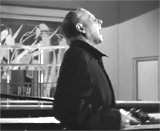
Impalement Stabbing-Murder of Mundson
|
- murder charges were dropped by Obregon
(who self-admitted he was "a pushover for a love story") when the
death was judged to be "justifiable homicide" due to self-defense; Obregon
refused to accept Johnny's attempt to take the blame for Mundson's
murder, since Mundson had already been declared dead: ("A man can
only die once. And Mundson committed suicide three months ago")
- in the upbeat finale to satisfy
the Hays Code censors, the couple hastily reconciled with each other after many months of an
explosive relationship - in the film's tacked-on Hollywood ending
that lacked credibility. The film's final line of dialogue was spoken
by Gilda to Johnny: "Johnny, let's go home. Let's go home."
|

Introduction of Dice-Gambler Johnny Farrell (Glenn Ford)
On South American Waterfront With US Sailors

Mundson: "My faithful and obedient friend" (referring to his dagger-cane)
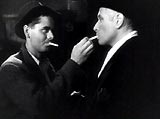
Saved by Casino Owner Ballin Mundson and His Cane with
a Concealed Dagger

Farrell With Mundson in His Casino Office After Caught Cheating at Blackjack
(21) - Bargaining for a Job

Mundson In Front of His Shuttered Office Window Where He Often Observed
the Casino
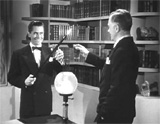
Johnny and Ballin Toasting to "The Three of Us"

Johnny's Dumb-founded Reaction to News of a "Canary" in Mundson's Bedroom
Suite


Gilda - Introducing Herself to a Stunned Johnny as "Mrs.
Ballin Mundson"

The Threesome Love Triangle Having Dinner in the Casino

A Toast to Gilda's Proposal to Hate Her Own Intrusion

Gilda's Provocative Dancing with Captain Delgado
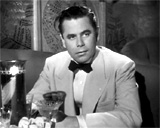
Johnny Watching Jealously From Afar

Johnny Warning Gilda: "Pardon me, but your husband is showing"

Mundson's Toast to Johnny's Past Disastrous Love ("Disaster
to the wench")

Gilda to Gabe: "If I'd been a ranch, they would've
named me the Bar Nothing"

Mundson's Wall Safe With Documents Regarding His German
Monopolistic Business

Gilda Caught Returning Late with Gabe by Johnny

Johnny Asserts His Control Over Gilda's Love Life

"Who do you think you're kidding,
Johnny?"


Johnny Returning Gilda Home Early in Morning (Mundson's
Silhouette on Right and then on Left)

Two Threatening German (Nazi?) "Messenger Boys" Working With Ballin
on the Tungsten Cartel


Carnival - Johnny and Gilda Dancing

Discovery of Dead German (Murdered by Mundson) At Midnight During
Carnival Party

Johnny Taking Over as "Sole Executor" and Head of Casino ("It's
gonna be business as usual")

Johnny and Gilda After Being Married in Justice's Office
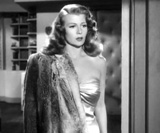
Gilda: "Hello, remember me? I'm Gilda, your wife"

Gilda to Johnny: "Got a light?"

Gilda: "There's never been anybody but you and me"

Gilda - Dating Other Men to Spite Her Husband Johnny

Obregon Threatening to Close The Casino If Johnny Didn't Talk


After Gilda's Strip-Tease, Johnny's Anger at Gilda

Obregon to Johnny: "It's
the most curious love-hate pattern I've ever had the privilege
of witnessing"

Johnny to Gilda: "I want to go with you, Gilda. Please, take me"

Gilda Acknowledging Johnny's Regret: "Nobody has to apologize, because
we were both such stinkers, weren't we?"

Last Line: "Johnny, let's go home. Let's go
home"
|








































